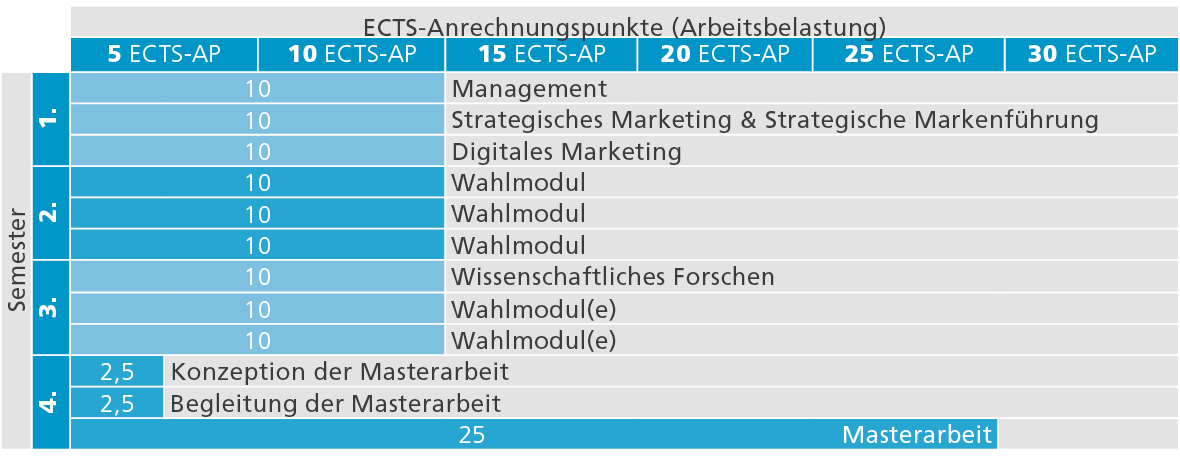Masterstudium Marketing und Branding
Curriculum (2021W)
Ab dem Wintersemester 2024/2025 darf eine Zulassung zu diesem Studium nur nach dem neuen Curriculum erfolgen. Das nachfolgende Masterstudium finden Sie hier »
Master of Science
Dauer/ECTS-AP
4 Semester/120 ECTS-AP
Studienart
Vollzeit
Unterrichtssprache
Englisch
Voraussetzung
Bachelorabschluss/Äquivalenter Abschluss und Sprachnachweis
Fakultät
Fakultät für Betriebswirtschaft
Niveau der Qualifikation
Master (2. Studienzyklus)
ISCED-11: Stufe 7, EQR/NQR: Stufe 7
ISCED-F
0414 Marketing und Werbung
Studienkennzahl
UC 066 617
Bewerbung
Für einen optimalen Studienverlauf wird dringend empfohlen, das Studium im Wintersemester aufzunehmen. Mit Ausnahme eines Wahlkurses können im Sommersemester keine Kurse besucht werden.
Das Curriculum ist die Grundlage eines Studiums und vermittelt einen detaillierten Überblick zum Aufbau, zum Inhalt, zur Prüfungsordnung und zum Qualifikationsprofil.
Mittels Curriculum können mehrere wichtige Fragen bereits vor Studienbeginn geklärt werden: welche Zulassungsvoraussetzungen gelten für das Masterstudium Marketing und Branding, wie lange dauert das Studium, welche Module müssen absolviert werden etc.
Für das Masterstudium Marketing und Branding gilt aktuell das Curriculum 2021W.
Informationen zum Curriculum (2021W)
Die Gesamtfassung des Curriculums spiegelt das aktuell gültige Curriculum wider, ist rechtlich unverbindlich und dient lediglich der Information. Die rechtlich verbindliche Form des Curriculums inkl. etwaiger Änderungen finden Sie in den entsprechenden Mitteilungsblättern.
Die Information, welche Curriculumsversion für Sie gilt, entnehmen Sie bitte Ihrem Studienblatt
abrufbar unter: https://lfuonline.uibk.ac.at/public/lfuonline_meinestudien.studienblatt
Spalte: Curriculum in der geltenden Fassung
- Curriculum/Gesamtfassung (ab 01.10.2021)
- Mitteilungsblatt vom 01.09.2021, 102. Stück, Nr. 1029 (Berichtigung des Curriculums)
- Mitteilungsblatt vom 28.06.2021, 86. Stück, Nr. 892 (Berichtigung des Curriculums)
- Mitteilungsblatt vom 03.05.2021, 58. Stück, Nr. 697
Voraussetzung
Fachlich infrage kommendes Bachelor- bzw. Diplomstudium an der Universität Innsbruck:
- Bachelorstudium Wirtschaftswissenschaften - Management and Economics
- Bachelorstudium Internationale Wirtschaftswissenschaften
- Diplomstudium Internationale Wirtschaftswissenschaften
Nachweis der Allgemeinen Universitätsreife:
Die allgemeine Universitätsreife für die Zulassung zu einem Masterstudium ist durch den Abschluss eines fachlich in Frage kommenden Bachelorstudiums, eines anderen fachlich in Frage kommenden Studiums mindestens desselben hochschulischen Bildungsniveaus an einer anerkannten inländischen oder ausländischen postsekundären Bildungseinrichtung oder eines im Curriculum des Masterstudiums definierten Studiums nachzuweisen. Zum Ausgleich wesentlicher fachlicher Unterschiede können Ergänzungsprüfungen (maximal 30 ECTS-AP) vorgeschrieben werden, die bis zum Ende des zweiten Semesters des Masterstudiums abzulegen sind. Das Rektorat kann festlegen, welche dieser Ergänzungsprüfungen Voraussetzung für die Ablegung von im Curriculum des Masterstudiums vorgesehenen Prüfungen sind.
Im Zuge des Nachweises der Allgemeinen Universitätsreife wird jedenfalls die Absolvierung folgender Kernbereiche im Rahmen des abgeschlossenen Bachelorstudiums geprüft:
- 92,5 ECTS-AP aus dem Kernbereich wirtschaftswissenschaftlicher Fächer, davon mind. 50 ECTS-AP aus dem Kernbereich betriebswirtschaftlicher Fächer sowie fundierte Kenntnisse in Marketing und in wirtschaftswissenschaftlichen Methoden
Diese fundierten Kenntnisse gelten jedenfalls als erbracht, wenn Lehrveranstaltungen im Ausmaß von mind. 10 ECTS-AP aus dem Bereich Internes und Externes Rechnungswesen, 10 ECTS-AP aus Mathematik und/oder Statistik und/oder wirtschaftswissenschaftlichen Methoden sowie mind. 12,5 ECTS-AP aus den Bereichen Marketing, Handel, Strategie, Unternehmensführung oder Dienstleistungsmanagement positiv absolviert wurden.
Da die Zulassungsprüfung mehrere Wochen in Anspruch nehmen kann, ist es empfehlenswert, für einen Start des Studiums zum Wintersemester (1.10.) den entsprechenden Antrag auf Zulassung entsprechend frühzeitig einzureichen.
Empfohlener Studienverlauf
Der unten angeführte, exemplarische Studienverlauf gilt als Empfehlung für Vollzeitstudierende, die das Studium im Wintersemester beginnen. Die Aufstellung dient der Darstellung eines möglichen Studienablaufs und ist nicht verpflichtend. Etwaige Prüfungswiederholungen bzw. deren studienzeitverzögernde Wirkung sind nicht berücksichtigt.
Die Regelstudienzeit beträgt 4 Semester bzw. 120 ECTS-AP, wobei gemäß Universitätsgesetz die Arbeitsbelastung eines Studienjahres 1.500 (Echt-)Stunden zu betragen hat und dieser Arbeitsbelastung 60 Anrechnungspunkte zugeteilt werden (ein ECTS-Anrechnungspunkt entspricht einer Arbeitsbelastung der Studierenden von 25 Stunden).
10,0 ECTS-AP: Marktforschung und Datenanalyse
10,0 ECTS-AP: Strategisches Marketing & Strategische Markenführung
10,0 ECTS-AP: Digitales Marketing
10,0 ECTS-AP: Wahlmodul
10,0 ECTS-AP: Wahlmodul
10,0 ECTS-AP: Wahlmodul
10,0 ECTS-AP: Wissenschaftliches Forschen
10,0 ECTS-AP: Wahlmodul(e)
10,0 ECTS-AP: Wahlmodul(e)
2,5 ECTS-AP: Konzeption der Masterarbeit
2,5 ECTS-AP: Begleitung der Masterarbeit
25,0 ECTS-AP: Masterarbeit

| Semester | ECTS-AP | Titel |
|---|---|---|
Informationen zur Prüfungsordnung inkl. Bewertung und Benotung
Prüfungsordnung
Die Prüfungsordnung ist integraler Bestandteil des Curriculums, detaillierte Informationen finden Sie unter dem Paragrafen Prüfungsordnung.
Bei der Notenverteilungsskala handelt es sich um die statistische Darstellung der Verteilung aller positiv absolvierten Prüfungen, die innerhalb eines Studiums bzw. eines Studienfaches (unter Heranziehung aller gemeldeten Studierenden eines Studiums bzw. eines Studienfaches) erfasst wurden. Die Notenverteilungsskala wird in regelmäßigen Abständen aktualisiert.
| A | B | C | D | E |
|---|---|---|---|---|
| Österreichische Notenskala | Definition | %-Satz | ||
| 1 | SEHR GUT: Hervorragende Leistung | = 100% | ||
| 2 | GUT: Generell gut, einige Fehler | |||
| 3 | BEFRIEDIGEND: Ausgewogen, Zahl entscheidender Fehler | |||
| 4 | GENÜGEND: Leistung entspricht den Minimalkriterien | |||
| 5 | NICHT GENÜGEND: Erhebliche Verbesserungen erforderlich, Erfordernis weiterer Arbeit |
wird aktualisiert
Gesamtbeurteilung der Qualifikation
Nicht zutreffend
Erklärung: Eine Gesamtbeurteilung (mit Auszeichnung bestanden, bestanden, nicht bestanden) wird nur über eine studienabschließende Prüfung, die aus mehr als einem Fach besteht, vergeben (im Curriculum dieses Studiums ist diese nicht vorgesehen).
Termine
13.02.2023 bis einschließlich 17.02.2023
Anmeldefrist: Montag,30.01.2023 bis einschließlich 06.02.2023 12:00 Uhr
17.04.2023 bis einschließlich 21.04.2023
Anmeldefrist: Montag, 03.04.2023 bis einschließlich 10.04.2023 12:00 Uhr
22.05.2023 bis einschließlich 26.05.2023
Anmeldefrist: Montag, 08.05.2023 bis einschließlich 15.05.2023 12:00 Uhr
Änderungen aus organisatorischen Gründen vorbehalten.
10.07.2023 bis einschließlich 14.07.2023
Anmeldefrist: Montag, 26.06.2023 bis einschließlich 03.07.2023 12:00 Uhr
11.09.2023 bis einschließlich 15.09.2023
Anmeldefrist: Montag, 28.08.2023 bis einschließlich 04.09.2023 12:00 Uhr
04.12.2023 bis einschließlich 07.12.2023
Anmeldefrist: Montag, 20.11.2023 bis einschließlich 27.11.2023 12:00 Uhr
Änderungen aus organisatorischen Gründen vorbehalten
Formulare
- Anmeldung der Masterarbeit
- Beurteilung des Pflichtmoduls: Konzeption der Masterarbeit
- Deckblatt der Masterarbeit
- Eidesstattliche Erklärung (der Masterarbeit beifügen)
- Einreichung der Masterarbeit
- Sperre der Masterarbeit
Anerkennungen
Kontakt und Information
Prüfungsreferat
Standort Universitätsstraße 15
Studienbeauftragte
Mag. Mag. Dr. Verena Wieser
Studiendekan
Univ.-Prof. Mag. Dr. Mike Peters
